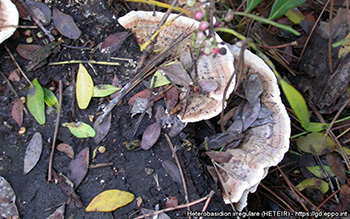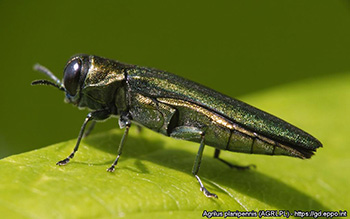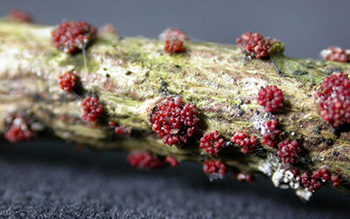
24th Meeting of Panel on Quarantine Pests for Forestry
Paris, 2019-03-18/20
The EPPO Panel on Quarantine Pests for Forestry met in Paris and considered outcomes of the two recent Conferences on Agrilus spp. The Panel had a joint session with the EPPO Panel on Phytosanitary Measures to discuss issues of interest for both groups: in particular, this included the Study on bark and ambrosia beetles on non-coniferous wood, the PM 9 Standard on Heterobasidion irregulare and the PM 3 Standard on Sentinel woody plants.
The Panel decided that the EPPO Standard PM 9 on Agrilus planipennis could be revised including information on new developments but considered it is necessary to wait for the latest developments from EFSA ensuring that EFSA and EPPO documents are consistent. The Panel agreed that it is very important that biological control agents both non-indigenous and indigenous are used in the EPPO region.

Heterobasidion irregulare. Courtesy: Angelo Mazzaglia,
University of Studies of Tuscia, Viterbo (IT).

Agrilus planipennis.
Courtesy: Eduard Jendek

Neonectria neomacrospora. Courtesy: Venche Talgø,
Norwegian Institute of Bioeconomy Research (NO)
Emerging situations in EPPO countries in forest protection were considered and it was noted that many indigenous pests have become invasive and very damaging probably due to climate change and natural events such as droughts, windthrows and snowbreaks.
The Panel considered the draft PM 8 Standards on Fraxinus, Juglans and Ulmus after country consultation. The Panel decided on some general changes for consistency in the PM 8 Standards, discussed comments received from EPPO countries and amended these draft Standards accordingly. These drafts will be presented to the EPPO Working Party on Phytosanitary Regulations for approval. The Panel considered the new draft PM 8 Standards on Acer, Platanus and Tilia, amended them and proposed to send them for country consultation.
The draft PM 3 Standard on Sentinel woody plants was discussed after country consultation, recognising the importance of the ‘sentinel plants’ concept for NPPOs as a tool for early warning for pest risks, but also recognising the necessity of its redrafting to make the concept clearer. A small group is needed for redrafting.
The Panel considered the draft PM 9 Standard on Heterobasidion irregulare and comments received at country consultation and agreed that the Standard could be sent for approval to the Working Party on Phytosanitary Regulations after several corrections and amendments.
The updated EPPO Alert List was discussed focusing on pests of concern for forestry and recommendations were provided. The Panel did not recommend any deletions from the Alert List. The Panel recommended conducting PRA for Neodiprion abietis and Neonectria neomacrospora. The Panel recommended inclusion of Phaeocryptopus nudus, Dendroctonus valens and Saperda tridentata into the EPPO Alert List.
The Panel supported the idea to organise a Workshop on ISPM 15 because there are still many problems with its practical implementation: in marking wood packaging material, in treating and marking painted pallets, in non-compliance of wood packaging material with the ISPM requirements (what is considered non-compliant and what to do with this), in the legal basis for actions, etc. However, it is necessary to reach a consensus about what the objectives of the Workshop should be, who the target group is, and what it should focus on.
